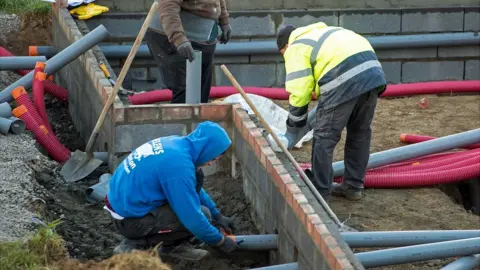EU needs migrant labour reform - France's Macron
 AFP
AFPFrench President Emmanuel Macron has warned that the EU risks breaking up if it fails to reform the rules on temporary foreign workers.
He was speaking in Romania, one of the ex-communist countries whose low wages and social charges make their workers cheaper to hire for temporary work in France and other richer EU nations.
Mr Macron said "some political and business circles" in the EU were trying to promote "social and fiscal dumping".
He wants EU-wide reform of the rules.
Failure to do so this year, he warned, would "risk a break-up of the EU". He promised French voters during the presidential election campaign that he would fight "social dumping" in the EU.
By recruiting from low-wage countries in Central and Eastern Europe, some firms avoid making payments into costly state health and welfare schemes. The building industry is a key focus of complaints about imported EU workers in France.
France has long pressed for reform of the EU's Posted Workers Directive, which allows firms to send their cheaper workers to another EU nation and keep them on existing employment terms, not those of the host country.
In 2015 there were 2.05 million posted workers in the EU, the European Commission says. Their number has increased by 41.3% since 2010.
Nationalist pressure
Mr Macron linked resentment over the directive to the rise of populism and anti-EU feeling in many EU countries.
One of his goals is to reduce unemployment in France - still high at 9.6% in June. Nationalists, like his rival Marine Le Pen of the National Front (FN), accuse the EU of fostering unfair competition to the detriment of French workers.
 EPA
EPAPolish Prime Minister Beata Szydlo warned on Thursday that "we are not going to change our stance".
"We will defend our position to the very end, because it is a position that is in the interests of Polish workers."
The EU plans to hold a summit in October to address the tensions over the directive.
Mr Macron is on a European tour aimed at rallying support for reform, but Poland and Hungary suspect French protectionism which, they fear, would undermine the EU's freedom of labour principle. France wants to make 12 months the maximum period that a worker can be "posted".
Legal battles
In Austria on Wednesday, Mr Macron called the current directive a "betrayal of the European spirit" by encouraging a race to lower social standards.
Austria backed his call for reform, and in Bucharest his Romanian counterpart, Klaus Iohannis, also said "the directive needs to be improved". But Mr Iohannis added that many eastern Europeans wanted to work in western countries, and their interests had to be respected.
The leaders of the Czech Republic and Slovakia expressed cautious support for a revision of the directive. To become law, a revised Posted Workers Directive requires a qualified majority vote in the EU Council - not the support of all 28 nations.
Two European Court of Justice (ECJ) rulings in 2007 made it easier for firms to defy local trade union pressure and employ cheaper workers from abroad. The Laval case concerned Latvian workers posted to building sites in Sweden, and the Finnish ferry company Viking Line got backing for its hiring of Estonians.
But in October 2014, a French court ruled that Ryanair had to pay €8.3m (£7.6m), ruling that it had broken local labour laws by employing more than 120 staff on Irish contracts in Marseille.
